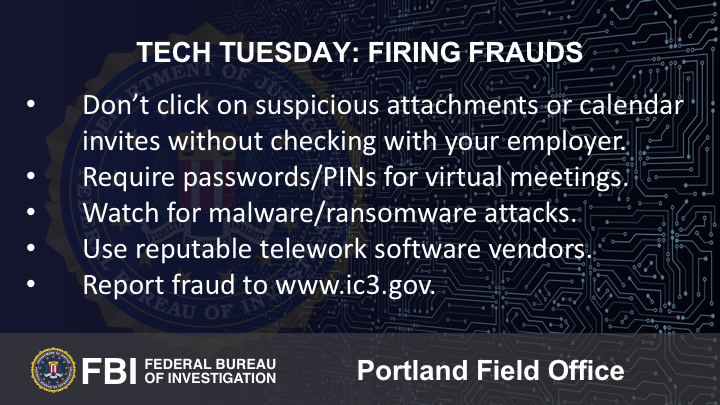Oregon FBI’s Tech Tuesday: Avoiding firing scams

PORTLAND, Ore. (KTVZ) -- This week, the Oregon FBI’s Tech Tuesday segment focuses on building a digital defense against termination scams.
Over the past few months, we’ve talked quite a bit about hiring scams. But today, we are looking at the flip side of this fraud – scams targeting those worried about getting fired, not hired.
With so many people working from home these days, many are relying more on virtual environments to get their job done. Remote meetings? Every day. Virtual assignments? Definitely. Less communication with your boss? More than likely.
All of this makes work-from-home employees more vulnerable to phishing scams that look to be legitimate emails or calendar invites. With so many businesses cutting back and fears of layoffs running high - it’s easy for criminals to use phishing frauds to commit firing frauds.
Employees can receive messages that include vague, attention-grabbing subject lines such as “Termination Review Meeting.” The emails may cite the current COVID-19 pandemic as the reason for downsizing, give instructions describing how to process out from the company, and direct the employee to click a potentially malicious link to receive termination benefits.
Of course, as with every phishing scam, if you click on a bad link, you can download malware onto your device, giving the fraudster access to your personal information and allowing him to lock your computer.
Here’s another twist on this scam: a victim receives a video teleconference – or VTC – meeting request regarding his purported termination.
The email will contain a link such as “Join this Meeting.” Recipients who fall victim to this attack have login credentials, as well as any other information stored on the VTC platform compromised.
Here are some signs for employers to watch for:
- Calls from employees who mistakenly believe themselves to be terminated.
- Employees reporting malware or ransomware infections.
- Employees reporting suspicious activity on legitimate accounts such as video conferencing accounts.
- Emergence of fake VTC applications installed on users’ smartphones, tablets, or computers.
Here are some ways for employers and employees to protect themselves:
- Select trusted and reputable telework software vendors; conduct additional due diligence when selecting foreign-sourced vendors.
- Require the use of passwords or PINs for any teleconference or web meetings.
- Use tools that block suspected phishing emails or that allow users to report and quarantine them.
- Educate yourself about social engineering tricks that fraudsters use to get you to reveal personal information
- Never open attachments or click on links in emails that you weren’t expecting
As always, if you have been victimized by a cyber fraud, you can report it to the FBI’s Internet Crime Complaint Center at www.IC3.gov or call your local FBI office.